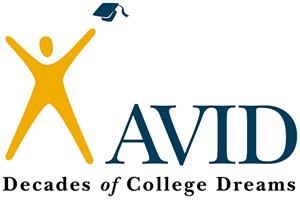Welcome
Page Navigation
- Larsen Middle
- AVID
- Syllabus
-

COURSE DESCRIPTION: Advancement via Individual Determination (AVID) is an elective class where students will develop and reinforce attitudes, skills, and knowledge to successfully enter and complete advanced class work. Students will learn and apply study skills and learning strategies to improve performance in all classes. Students are required to enroll in a rigorous course of study, maintain satisfactory grades and demonstrate outstanding citizenship while participating in AVID. In order to ensure your child’s successfulness in a rigorous course of study, students will be required to participate in a tutorial process to enhance and support them in their coursework. We will also be visiting colleges and participating in team building exercises to help the students set future goals that they can achieve.
COURSE OBJECTIVE: The AVID elective class is the key element for the AVID program. The AVID program is aimed at directing students to a college-bound path. This will be done by holding tutorials, teaching organizational skills, and developing the learning process with high-level critical thinking skills.
GRADING POLICY: Students will be asked to show evidence of learning through formative and summative assessments toward the standards. In some instances, students will be asked to re-do work, and in this instance there will be a process. All graded work will be marked in the following manner:
4 = Mastery Tasks or the target of instruction allows students to apply their knowledge and skills to new or related situations and scenarios. A mark of 4 indicates not only evidence of application and analysis but also includes synthesis and evaluation.
3 = Proficient Task or the target of instruction consist of complex knowledge, skills, application, and analysis.
2 = Basic Tasks are basic recall and simple skills which include knowledge and comprehension.
1 = Below Basic. There is some evidence of emerging simple skills, there are gaps in knowledge and unreliable comprehension skills are seen.
0 = No evidence of proficiency. There is no evidence of learning including missing work and incomplete work.
**Work not turned in will receive a grade of “M”, which is a “0” in the grade book
Definitions:
Formative: or assessment for learning, occurs during the learning process and provides information to both teachers and students that enables them to make adjustments to increase learning. Examples may include: class work, binder checks and tutorials.
Summative: or assessment for learning, occurs after instruction to find out what students know and understand and can do at one point in time. Examples many include: major projects, essays, etc.
Students in the AVID elective class can expect the following schedule for the week in AVID:
Monday Tuesday Wednesday Thursday Friday Curriculum/
Learning LogsTutorials/
Learning LogsCurriculum/
Learning LogsTutorials/
Learning LogsBinder Check and ONE of the following: Team-Building Activities, Group Discussion, Guest Speakers, etc. Tutorials allow students to discuss specific questions related to the content area classes they are taking. AVID is an academic support class that uses tutorials and college tutors to help support students academically. Twice a week the students will be expected to bring specific questions from their other classes and work together in groups to solve them. There will be tutors and myself in the classroom to help with guide students through this process. Tutors will not be handing out answers, but helping the students find the answers themselves. Students take Cornell notes throughout the tutorial session and ask all levels of questions (Level 1- basic-getting into the topic, Level 2- medium-getting through the topic, and Level 3-advanced-going beyond the topic) to reach new understandings of the material, together with AVID college tutors as facilitators.
Curriculum days will be spent learning common academic vocabulary words that will appear now, throughout their high school career and beyond. In addition, students will use curriculum days to hone their skills in Cornell note-taking, use of the SQ4R (Survey, Question, Read, Recite, Write, Review) method for using textbooks in their classes, as well as Socratic seminars (Structured Group Discussion) to more fully experience how a discussion functions in an academic setting with a focus on developing text analysis skills and speaking/group discussion skills. Students will be assigned various readings and be asked to respond to them in learning logs. In addition to the above, curriculum days will have a portion of time devoted to critical thinking problems to solve with classmates.
Binder checks will be used to note the academic progress or lack thereof, as well as, organization of the student in AVID. These binder checks will lead to a discussion of the learning process as incremental and a daily task. It will also lead to discussions about goals for the future, how to achieve them, etc. On binder check days, students will also be engaged in cooperative activities designed to foster trust among students and building a learning community that they will be a part of for years to come.
Learning logs provide a formative on going assessment of student learning. They are one of the most effective means of writing to learn because they foster reflection on learning processes. Students will be required to complete a learning log.
Classroom Rules
- Have all appropriate materials (book, pen/pencils, etc.) readily available before the bell rings.
- Be in your seat and working on opening assignment when the tardy bell rings.
- Live Respectfully, Earn Respect
- Make Responsible Choices
- Safety First

